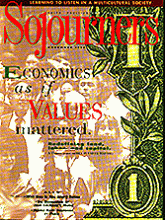New voices that transcend the old polarities of left and right are offering fresh alternatives in economics. For decades we were enmeshed in endless arguments between the "market economy" of world capitalism and the "command economy" of state-directed socialism.
With the end of the Cold War and the collapse of communism, capitalism also requires fresh evaluation, especially in its failures in regard to both equity and ecology. The sheer number of the world's poor and the magnitude of our environmental crises demand a deeper moral response. The failures of both ideological systems cry out for something new. But what could it be? Perhaps the new concept we are searching for is best described as a "community economy."
The details of what a community economy would look like are far from clear. But any new possibilities will require important shifts in our habits, assumptions, ways of thinking, and--ultimately--our ethics concerning economics. It is time to recall our best moral and religious values and begin to reshape our economics as if those values mattered.
Asking some fundamental questions can help to suggest some new directions. Instead of merely asking what will make a profit or what a central bureaucracy could do, we must begin to ask ourselves what would best serve the needs of a human and ecological community.
Goods and services need to be produced, but the wealth from such production could certainly be shared more equitably than it is now. The enormous income disparities between the top echelons of corporate America and the bottom rungs of the economy simply cannot be justified by differences in class background, education, opportunity, or even ability. How do we square the enormous polarities with the ultimate moral worth that our ethical and religious traditions would ascribe to each individual?
Read the Full Article

